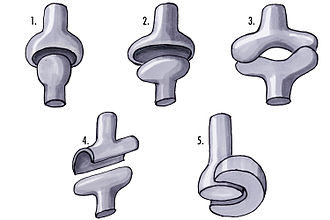Ball-and-socket joint

== Ball-and-socket joint ==
A ball-and-socket joint (or spheroidal joint) is a type of synovial joint in which the ball-shaped surface of one rounded bone fits into the cup-like depression of another bone. This arrangement allows for a wide range of movement in almost all directions, including flexion, extension, abduction, adduction, and rotation.
Structure[edit]
The ball-and-socket joint consists of a spherical head (the ball) that fits into a rounded cavity (the socket). The articular cartilage covering the surfaces of the bones reduces friction and absorbs shock. The joint is enclosed by a joint capsule lined with synovial membrane that secretes synovial fluid for lubrication.
Function[edit]
Ball-and-socket joints allow for the most extensive range of motion of all joint types. They are capable of multiaxial movement, meaning they can move in multiple planes. This makes them crucial for activities that require a high degree of flexibility and mobility.
Examples[edit]
The most well-known examples of ball-and-socket joints in the human body are the shoulder joint and the hip joint.
- The shoulder joint (glenohumeral joint) is formed by the articulation of the humerus with the glenoid cavity of the scapula.
- The hip joint (acetabulofemoral joint) is formed by the articulation of the femur with the acetabulum of the pelvis.
Clinical Significance[edit]
Ball-and-socket joints are susceptible to various injuries and conditions, such as dislocation, arthritis, and bursitis. Proper functioning of these joints is essential for maintaining mobility and performing daily activities.
Related Joints[edit]
Other types of synovial joints include:
See Also[edit]
Ad. Transform your life with W8MD's Budget GLP-1 injections from $49.99


W8MD offers a medical weight loss program to lose weight in Philadelphia. Our physician-supervised medical weight loss provides:
- Weight loss injections in NYC (generic and brand names):
- Zepbound / Mounjaro, Wegovy / Ozempic, Saxenda
- Most insurances accepted or discounted self-pay rates. We will obtain insurance prior authorizations if needed.
- Generic GLP1 weight loss injections from $49.99 for the starting dose of Semaglutide and $65.00 for Tirzepatide.
- Also offer prescription weight loss medications including Phentermine, Qsymia, Diethylpropion, Contrave etc.
NYC weight loss doctor appointmentsNYC weight loss doctor appointments
Start your NYC weight loss journey today at our NYC medical weight loss and Philadelphia medical weight loss clinics.
- Call 718-946-5500 to lose weight in NYC or for medical weight loss in Philadelphia 215-676-2334.
- Tags:NYC medical weight loss, Philadelphia lose weight Zepbound NYC, Budget GLP1 weight loss injections, Wegovy Philadelphia, Wegovy NYC, Philadelphia medical weight loss, Brookly weight loss and Wegovy NYC
|
WikiMD's Wellness Encyclopedia |
| Let Food Be Thy Medicine Medicine Thy Food - Hippocrates |
Medical Disclaimer: WikiMD is not a substitute for professional medical advice. The information on WikiMD is provided as an information resource only, may be incorrect, outdated or misleading, and is not to be used or relied on for any diagnostic or treatment purposes. Please consult your health care provider before making any healthcare decisions or for guidance about a specific medical condition. WikiMD expressly disclaims responsibility, and shall have no liability, for any damages, loss, injury, or liability whatsoever suffered as a result of your reliance on the information contained in this site. By visiting this site you agree to the foregoing terms and conditions, which may from time to time be changed or supplemented by WikiMD. If you do not agree to the foregoing terms and conditions, you should not enter or use this site. See full disclaimer.
Credits:Most images are courtesy of Wikimedia commons, and templates, categories Wikipedia, licensed under CC BY SA or similar.
Translate this page: - East Asian
中文,
日本,
한국어,
South Asian
हिन्दी,
தமிழ்,
తెలుగు,
Urdu,
ಕನ್ನಡ,
Southeast Asian
Indonesian,
Vietnamese,
Thai,
မြန်မာဘာသာ,
বাংলা
European
español,
Deutsch,
français,
Greek,
português do Brasil,
polski,
română,
русский,
Nederlands,
norsk,
svenska,
suomi,
Italian
Middle Eastern & African
عربى,
Turkish,
Persian,
Hebrew,
Afrikaans,
isiZulu,
Kiswahili,
Other
Bulgarian,
Hungarian,
Czech,
Swedish,
മലയാളം,
मराठी,
ਪੰਜਾਬੀ,
ગુજરાતી,
Portuguese,
Ukrainian
